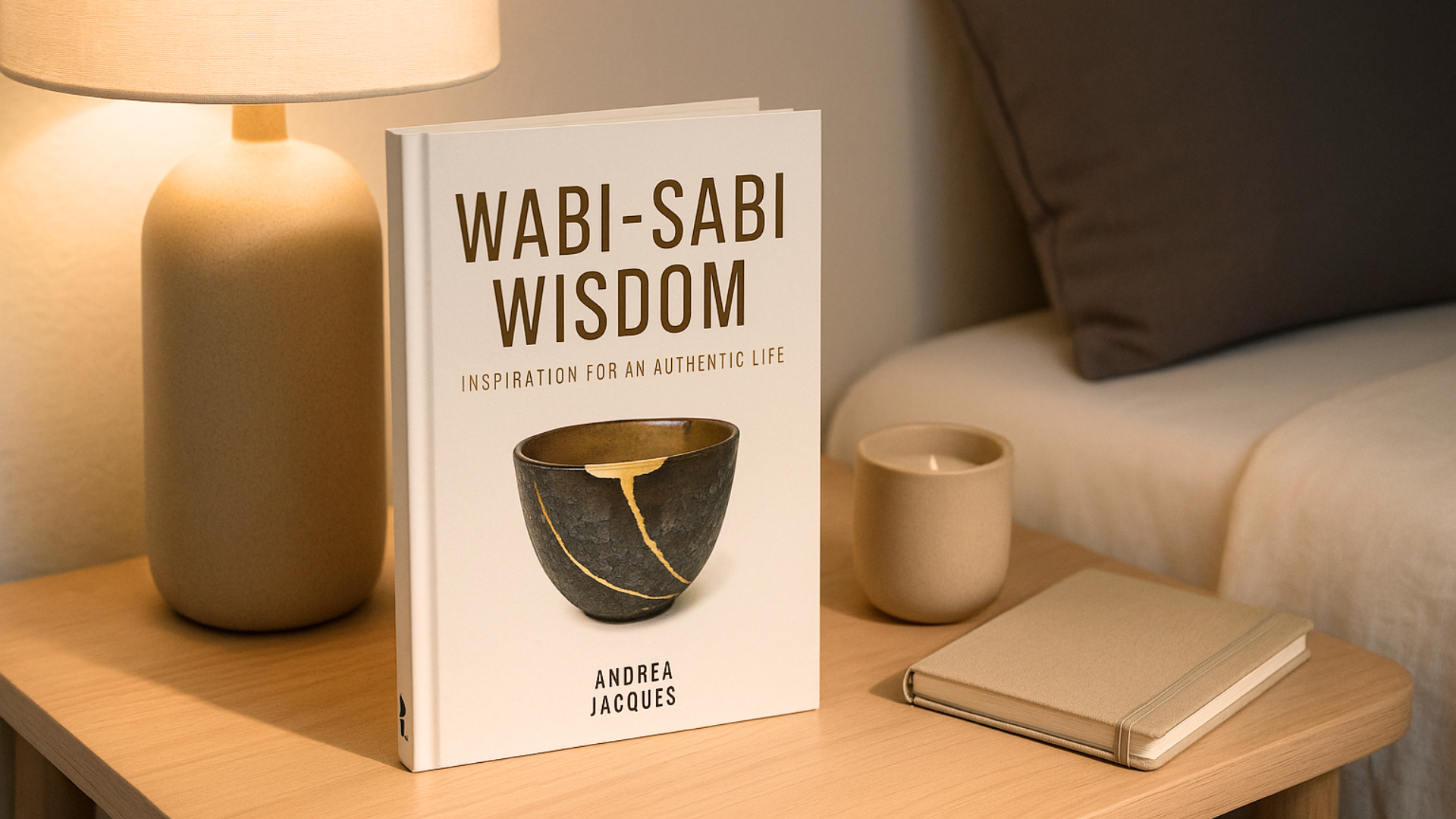Wabi-Sabi Wisdom: Redefining Success Through Self-Alignment

Book Review: Wabi-Sabi Wisdom by Andrea Jacques
A thoughtful invitation to embrace imperfection, honour inner truth, and live with greater ease and authenticity
In Wabi-Sabi Wisdom, Andrea Jacques offers a spacious, story-rich guide to reconnecting with what truly matters. Inspired by the Japanese concept of wabi-sabi, which honours imperfection, impermanence, and simplicity, Jacques weaves together personal reflections, cultural insights, and gentle questions that invite readers into deeper alignment with themselves.
This is not a prescriptive self-help book. It is a layered exploration of soulful success, meaningful work, creative expression, and inner peace. Jacques shares her lived experience with honesty and humility, encouraging readers to slow down, reflect, and find beauty in the messiness of real life.
What the book promises
The book invites readers to release the pressure to perform and to begin living from a place of internal clarity rather than external expectation. It draws on Japanese wisdom not as a trend, but as a lens for exploring timeless questions about purpose, enoughness, and personal growth.
Jacques promises reflection rather than instruction. Through short essays and accessible stories, she encourages readers to consider what is already working, what needs to be let go, and how to embrace the unique rhythms of their lives.
What the book delivers
Jacques delivers on this promise by curating a series of personal essays, originally written for publication, into a cohesive offering that explores themes of authenticity, healing, and creative renewal. Each chapter introduces a Japanese term and connects it to everyday life in thoughtful, personal ways.
Rather than offer solutions, the author shares her own stories of navigating burnout, self-doubt, and the tension between ambition and alignment. These reflections create space for readers to explore their own truths without feeling pressured to fix or perform.
The book is deeply grounded in lived experience. Jacques does not present herself as a guru or expert, but as someone who is walking the same path of questioning, listening, and becoming. This approach is both refreshing and reassuring for readers who are tired of being told to strive harder or push through.
Style and structure
The writing is gentle, clear, and reflective. Jacques writes in a voice that feels calm and grounded, often drawing on metaphors from nature, art, and Japanese culture to illustrate her ideas. She avoids jargon and keeps her language simple and sincere.
The book is structured as a collection of themed essays. Readers can move through it sequentially or dip into the chapters that feel most relevant in the moment. Each essay stands alone, yet collectively they form a consistent and affirming message about living with more intention and less pressure.
There are no strict action plans or bullet-point takeaways. Instead, readers are offered thoughtful questions, gentle invitations to pause, and a sense of being witnessed in their complexity.
Where the book shines
One of the book’s greatest strengths is its emotional accessibility. Jacques writes with honesty and vulnerability, which makes the material feel human and relatable. She does not shy away from her own mistakes or moments of uncertainty. This honesty creates trust and encourages readers to be equally honest with themselves.
The integration of Japanese concepts such as wabi-sabi, ikigai, and shokunin adds a unique texture to the book. Jacques uses these ideas not as decoration, but as meaningful anchors that have shaped her thinking and practice. Readers unfamiliar with these terms will find them gently introduced and thoughtfully applied.
Another area where the book shines is in its treatment of success. Jacques redefines success not as constant achievement, but as alignment with one’s values, energy, and true desires. Her exploration of what she calls “soulful success” is likely to resonate with anyone feeling the disconnect between external validation and internal peace.
Light limitations
Because the book is a collection of essays, there is some repetition across chapters. Readers seeking a linear progression or a single cohesive argument may find the format more fluid than structured. However, for those open to nonlinear reflection, the rhythm works well.
Some references to Japanese cultural practices are brief and would benefit from deeper context or acknowledgment of their origins. While Jacques writes with respect and personal connection, a few readers may wish for a more detailed exploration of how these concepts are traditionally understood and applied.
The pacing is intentionally slow and reflective. Readers who are looking for fast takeaways or tactical advice may find this book less immediately actionable, but those seeking depth will appreciate the space it provides.
Final thoughts
Wabi-Sabi Wisdom is a kind and contemplative guide for those who are feeling tired of striving and ready to return to themselves. Andrea Jacques writes with warmth, courage, and humility, offering reflections that feel like quiet truths uncovered through lived experience.
This book is best read slowly, perhaps with a journal nearby or a warm drink in hand. It encourages readers to trust the wisdom of their own lives and to honour the imperfect, unfinished parts of their journey. Rather than aiming to change the reader, it honours who they already are.
Highly recommended for creatives, entrepreneurs, and anyone navigating transition, burnout, or a quiet longing for a different pace.